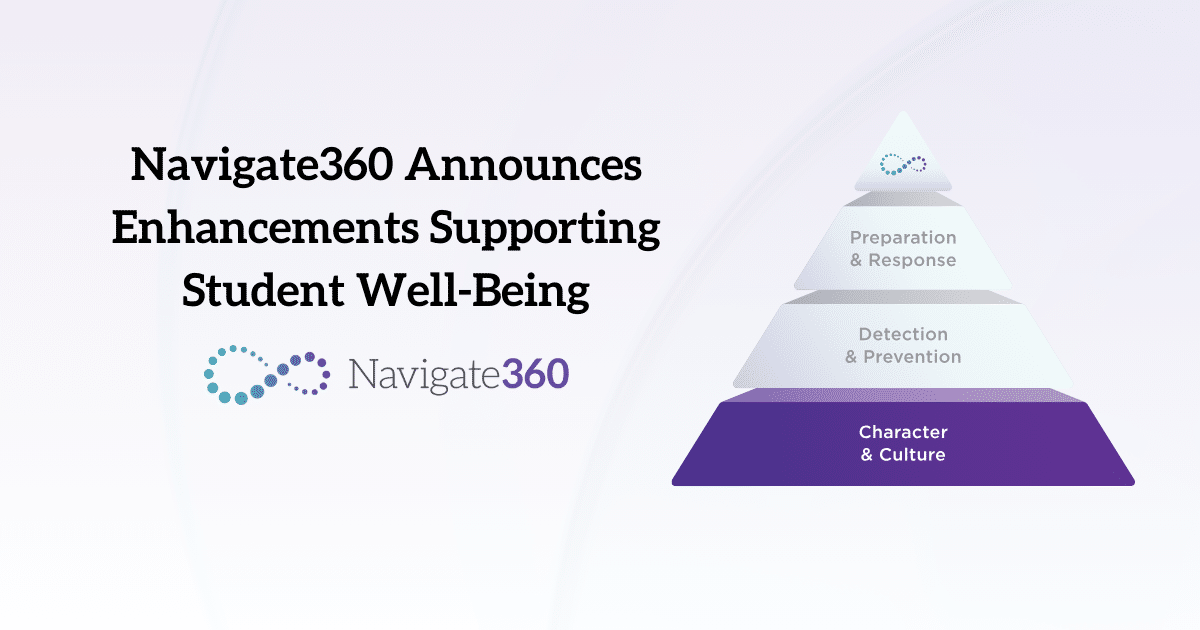The decade-long decline in the teen mental health and the overall wellbeing of young people from 2009 to 2019 was alarming enough on its own, and the COVID-19 pandemic in 2020 and 2021 only made matters worse. In October 2021, the American Academy of Pediatrics (AAP), the American Academy of Child and Adolescent Psychiatry (AACAP), and the Children’s Hospital Association (CHA) declared a national emergency in children’s mental health, and the U.S. Surgeon General released a public health advisory stating that young people’s rates of experiencing symptoms of depression and anxiety more than doubled during the pandemic just two months later.
This closer look into the thoughts and feelings of school-age youth has revealed that there is widespread concern for their mental health and emotional safety. And according to a recent survey on teen mental health and wellbeing, teens are particularly concerned that their schools aren’t doing enough to create this sense of safety for them.
How Students Report Feeling
In December 2021, Navigate360 and John Zogby Strategies conducted a nationwide survey of high school students aged 16-17 and found that the vast majority—48.5% of those polled—reported thinking more about their own physical and emotional safety and wellness than they had six months prior. Additionally, few have the highest confidence in their schools’ efforts to create an atmosphere of physical (17.2%) and emotional (12.5%) safety.
Students’ open-ended responses to the 2021 Navigate360/Zogby Strategies survey expressed their concern over schools’ ability to keep them safe from active shootings:
- “How my school isn’t taking the ‘School Shooting Challenge’ heavy enough”
- “I have a major concern about school shootings and other school-related violence happening after Christmas break.”
- “My biggest safety concern rn [right now] is the school shootings and constant threats that schools in my state are getting. My school has gotten multiple threats.”
- “The f**king school shooting threats”
The survey also uncovered many other issues concerning teens today, including:
- Nearly 60% (57.6%) of surveyed teens are concerned about their mental health
- Nearly 60% (58.4%) of surveyed teens are concerned about their emotional health
- More than half (54%) of students know someone who has been bullied because of their race, sexual orientation or family income level
- Nearly 60% (57.9%) of students know someone who has considered self-harm or suicide, and 41.6% of students have had these thoughts themselves
- More than half (52.8%) of students do not think that asking for help would do any good
Knowing Where to Turn for Help
The survey also asked the students which factors prevent them or their peers from asking for help:
- More than half of those surveyed said they think they can handle their problems on their own (53.9%)
- More than half said that they are afraid of getting in trouble (51.4%)
- Just under half listed not knowing who to ask (49.9%)
- Just under half cited a lack of access to helpful resources (46.5%)
- Of the factors that were clearly defined (not “other” or “not sure”), a negative stigma associated with asking for help was chosen the least often—only in 26.9% of surveys collected
Solutions to Meet Teens’ Mental & Emotional Health Needs
The sooner schools can prevent students in crisis from harming themselves and others—and the earlier schools can detect concerning behaviors, address them and properly intervene —the better positioned they will be to prevent escalation of troubling behaviors into violence. Students whose mental health needs go unmanaged, whether by the stigmas associated with seeking help or a lack of resources (as well as a lack of awareness about available resources), are more likely to commit acts of self-harm or violence.
According to the December 2021 survey, students are open to the idea of new technologies and services that promote and enhance school safety:
- Nearly one third (31.8%) of students would feel safer with a 24/7 anonymous tip-reporting platform at school
- More than half (57.4%) of students would be interested in taking short courses or completing educational content to help them learn how to manage their stress and anxiety
- More than half (55%) of students want part of the curriculum to be devoted to social-emotional learning
- More than half (55.3%) of students would be interested in training for the possibility of dealing with an on-campus threat, and 58.3% of students believe that training is an essential life skill (32.8% of those surveyed strongly agreed with that statement)
Of course, taking the time to acquire additional tools, learning how to use them, training staff on new procedures, and getting teachers to integrate evidence-based social-emotional learning and intervention into their existing curricula seems like a daunting task. This may be especially true for schools facing the challenges of limited time and staff. But with Navigate360’s accessible and integrated school safety solutions, any school can work toward creating a holistic culture of safety easily and seamlessly.
Better Together: All-Encompassing Mental Health & Wellness in Your District
At Navigate360, we believe in a holistic approach to school safety and have identified solutions that every school and district mush consider to effectively prevent harm to self and others. The following complement one another and integrate seamlessly into your existing safety procedures:
Social-Emotional Learning
The need for mental health intervention and management is perhaps greater than ever before. Navigate360 offers proactive and ongoing social-emotional learning (SEL) aimed at improving and developing students’ mental wellbeing, as well as their behavior management skills. Our SEL for Students curriculum consists of three tiers:
- High-quality SEL and mental health awareness curricula
- Small groups, individualized lessons and progress monitoring capabilities
- Individualized SEL, mental health and intervention lessons
This dynamic digital curriculum is designed to suit the preferences of Gen Z and Alpha students while being suited for all development levels. It’s rooted in at least one of the five Collaborative for Academic, Social, and Emotional Learning (CASEL) competencies.
Expert Threat Assessment Training for School Staff
Identifying signs of concerning behavior isn’t always easy to do. Choosing the best course of action after identifying a potential threat can also be quite complicated. That’s why Navigate360 offers specialized behavioral threat assessment and suicide prevention training that includes opportunities for hands-on practice. We offer in-person and virtual training courses that follow the Comprehensive School Threat Assessment Guidelines (CSTAG) and National Threat Assessment Center (NTAC) models. This training can help position staff members to offer much-needed support to students exhibiting concerning behavior.
Comprehensive Behavioral Threat & Suicide Case Management
A threat assessment program is one of the best ways to reduce the risk of violence at a school, but managing these cases as a team can be tricky without intuitive software. Navigate360’s Behavioral Threat & Suicide Case Management platform allows teams to gather, store and access information with a customizable, user-friendly interface to keep their members in the know at all times. This technology makes it simple to follow processes and focus on students.
Anonymous Tip Reporting
Staff alone can’t pick up on everything that happens on school grounds, and students who may have important information about their classmates are often hesitant to report any concerning behaviors Navigate360’s P3 School Tipline is an anonymous tip-reporting system with 24/7 accessibility that also:
- Creates a line of two-way dialogue with the tipster
- Provides school administrators and law enforcement with an intuitive interface to manage and share tips in real time
- Allows for coordination between multidisciplinary threat assessment teams
- Integrates directly with Navigate360’s Behavioral Threat & Suicide Case Management software to quickly process and document tips
Detect Digital Warning Signs
What do nearly all cases of self-harm or violence to others have in common? It’s leakage—the communication to a third party of an intent to harm. This can include the ideation, planning or preparation to commit such an act, and it’s not always spoken in the hallways or physically written on a note. Navigate360 Detect digital scanning technology uses artificial intelligence to sift through billions of digital conversations across social media and district-owned email domains to help schools get ahead of potential problems before they escalate. This routinely audited AI engine adheres to HIPAA, FERPA and social media platform agreements while protecting users’ privacy.
School Safety & Wellness Solutions that Work Better Together
Whether you need one or need them all, Navigate360 can meet you where you are. Our integrated and complementary school safety suite makes it easy to design, manage and support solutions customized to meet your specific needs and budget. Learn more about how our solutions work together to foster a safe and positive school culture here.




